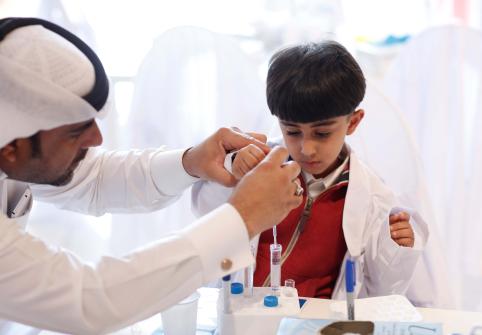News
HBKU’s Qatar Biomedical Research Institute focuses on community outreach
21 Jan 2016
Qatar Biomedical Research Institute (QBRI), one of Hamad Bin Khalifa University’s (HBKU) three specialized national research institutes, recently organized a series of awareness raising campaigns that focused on the brain, breast cancer research, and diabetes.
QBRI’s community outreach programs help bridge the gap between the scientific community and the public, inspiring greater academic interest in biomedical science and encouraging individuals to be conscious of the importance of awareness of their health. The Institute organized a breast cancer awareness campaign in October, a diabetes awareness campaign in November, as well as a number of youth-focused events around brain awareness in December.
Dr. Hilal Lashuel, Executive Director of QBRI, commented: “QBRI is committed to playing an active and leadership role to improve the quality of healthcare in Qatar. Our community outreach and awareness campaigns represent essential elements of our strategy to engage the public as partners in our efforts to improve healthcare through the development of new approach for prevention, early detection and targeted and personalized treatment for diseases that affect the Qatari population.”
According to the World Health Organization, breast cancer is one of the leading causes of cancer-related deaths worldwide. Among Qatari women, breast cancer diagnosis is projected to increase 60% over the next six years, necessitating more awareness of the complex disease and the extensive research being conducted on its causes, prevention, and treatment. In an effort to raise awareness about self-examinations and educate the public on research in the field, QBRI staff and researchers organized a series of public events and lectures in HBKU, Qatar University, and Villaggio shopping mall to educate the public about breast cancer and the importance of early detection, and to inform the public about latest medical breakthroughs and ongoing research activities at QBRI.
QBRI subsequently launched a campaign around World Diabetes Day in December. In collaboration with the Qatar Diabetes Association (QDA), QBRI scientists from its Diabetes and Obesity Research Center discussed causes and treatments for the disease at a public event. Dr. Abdelilah Arredouani and Dr. Mohamed Dehbi from QBRI emphasized the importance of testing and early diagnosis, specifically for individuals with a familial history of the disease, in order to prevent or delay the onset of diabetes-associated micro and macro-vascular complications including cardiovascular disease, diabetes blindness, diabetes kidney failure and diabetes-related low limb amputations. In response to public demand for information about the latest advances in stem cell-based therapies for the treatment of diabetes, QBRI’s Dr. Essam Abdelalim and Dr. Mohamed Emara also shared their insights about the most promising research discoveries and clinical trials being conducted on the ways in which stem cells may be used to treat diabetes patients. They also presented an overview of the stem cell research program at QBRI.
Also in December, QBRI organized, in collaboration with the International Brain Organization (IBRO) and local institutions, a number of youth-focused activities for Brain Awareness Week, which is a global initiative to increase awareness of the progress and benefits of brain research. The primary objectives of these activities were to share the excitement around the subject of brain research and to encourage young students to pursue future careers in science and brain research. Events ranged from a pre-school event, where children were able to use clay to sculpt the brain and asked to identify basic parts of it, to a Brain Talk competition encouraging 10-12 years old to create a 10-minute movie to discuss the parts of the brain.
The first round of a Brain Bee, an annual international competition that has more than 150 branches in over 30 nations, was also organized by QBRI to test students in grades 9-12 on their understanding and knowledge of the brain. Aimed to increase the number of students interested in biology, the competition is considered to be the largest worldwide neuroscience competition and takes place at the local, national and international levels. This is the first year Qatar has taken part, with QBRI coordinating with schools around Qatar and organizing the various rounds.
Reflecting on his experience of the competition, Ahmad Emad, a student from Mosaabbin Omair School in Qatar and a participant in QBRI’s Brain Bee, said: “I really enjoyed participating in the Brain Bee and found it to be both a challenging and a fun experience. I’ve never done something like this before and think the workshop and competition really helps those of us who are interested in medicine and biology prepare for our future.”
Dr Reem Al Olaby, who coordinated QBRI’s community-focused events, noted: “Community outreach and preparing the next generation of scientists in Qatar are crucial to what we do at QBRI. Ground-breaking research in biomedical science needs to be shared with the public as the end goal of many of our initiatives is to ultimately improve the health of the communities which we are a part of.”
She continued: “In particular, by working with schools in Qatar, we hope to interest students in the sciences and teach how much of what researchers do extends beyond laboratories and into the lives of people and families around the globe.”
